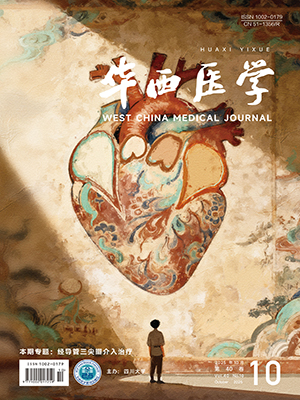| 1. |
谢志宏, 张颖. 重症监护病房医院感染及其相关因素分析[J]. 实用预防医学, 2016, 23(4):459-461.
|
| 2. |
罗江, 刘运喜, 刘亮, 等. 高龄患者医院感染直接经济损失及死亡率研究[J]. 中国热带医学, 2015, 15(6):723-727.
|
| 3. |
徐丽英, 季俏. ICU中心静脉导管相关性血流感染干预措施探 讨[J]. 中华医院感染学杂志, 2010, 20(12):1695-1697.
|
| 4. |
中华人民共和国卫生部. 医院感染诊断标准(试用)[J]. 中华医学杂志, 2001, 81(5):314-320.
|
| 5. |
王书会, 周成超, 徐凌忠, 等. 重症监护病房医院感染危险因素logistic回归分析[J]. 中国卫生统计, 2011, 28(5):513-515, 519.
|
| 6. |
钟明媚, 王璠, 张琳, 等. 重症监护病房卒中相关性肺炎的危险因素及病原学分析[J]. 中华急诊医学杂志, 2015, 24(9):1004-1010.
|
| 7. |
王力红, 马文晖, 张京利, 等. APACHEⅡ评分与医院感染相关性研究[J]. 中华医院感染学杂志, 2007, 17(6):651-653.
|
| 8. |
窦英茹, 潘春芳, 单雪芹, 等. 集束预防策略对导管相关性血流感染发生率影响的多因素分析[J]. 中华现代护理杂志, 2012, 18(10):1127-1130.
|
| 9. |
赵威莉, 李桂云. ICU获得性感染的危险因素分析及护理干预[J]. 国际护理学杂志, 2013, 32(11):2611-2613.
|
| 10. |
陈华, 杨雪英, 付秀莲. 糖尿病并发呼吸道感染的危险因素分析及对策[J]. 中国实用护理杂志, 2008, 24(33):17-18.
|
| 11. |
张京利, 赵霞, 王力红, 等. 重症监护病房患者医疗干预措施与医院感染的相关性研究[J]. 中华医院感染学杂志, 2010, 20(2):187-189.
|
| 12. |
王金锁, 刘辉, 刘芳芳. 留置导尿病人医院感染调查[J]. 中国消毒学杂志, 2010, 27(2):206-207.
|
| 13. |
徐艳, 郑金鼎, 杨怀, 等. 重症监护病房多药耐药菌目标性监测与干预措施的研讨[J]. 中华医院感染学杂志, 2011, 21(12):2590-2591.
|
| 14. |
Ji R, Shen H, Pan Y, et al. Novel risk score to predict pneumonia after acute ischemic stroke[J]. Stroke, 2013, 44(5):1303-1309.
|
| 15. |
Walter U, Knoblich R, Steinhagen V, et al. Predictors of pneumonia in acute stroke patients admitted to a neurological intensive care unit[J]. J Neurol, 2007, 254(10):1323-1329.
|
| 16. |
陶方萍, 何先弟, 段缓. 综合ICU内呼吸机相关性肺炎的多因素Logistic回归分析及护理对策[J]. 中国实用护理杂志, 2010, 26(31):18-20.
|




